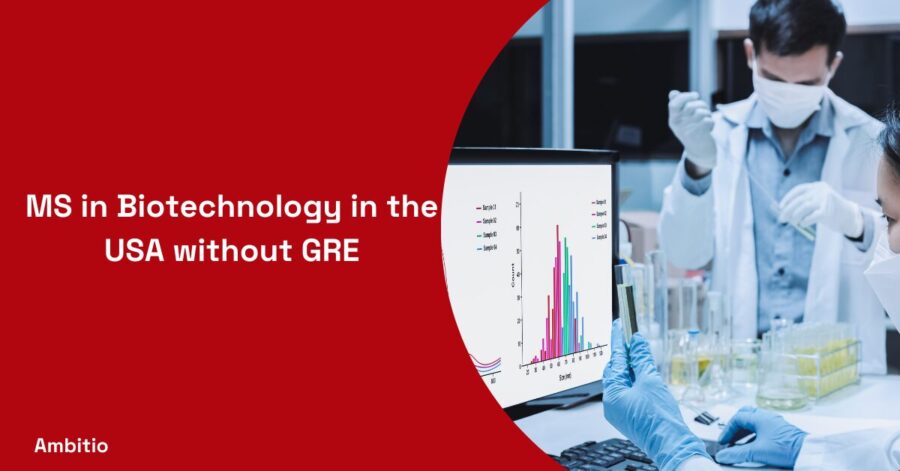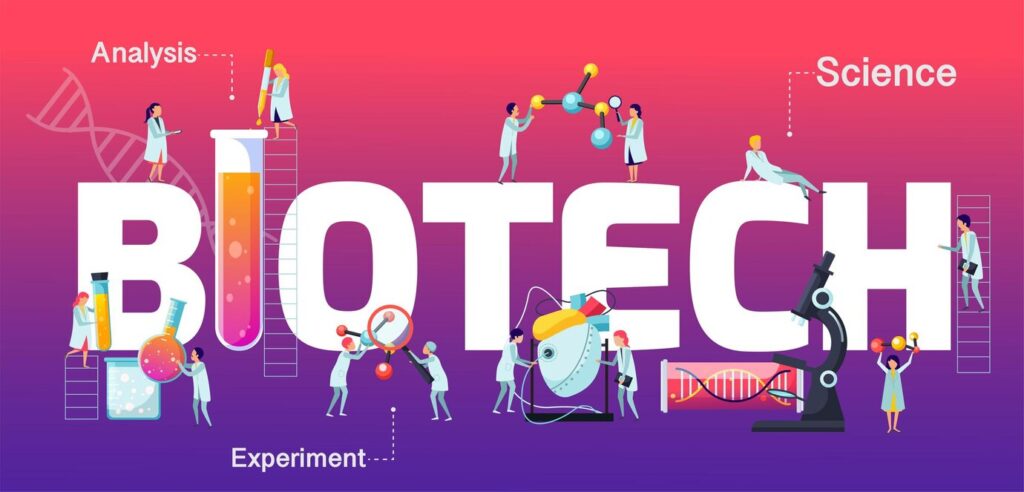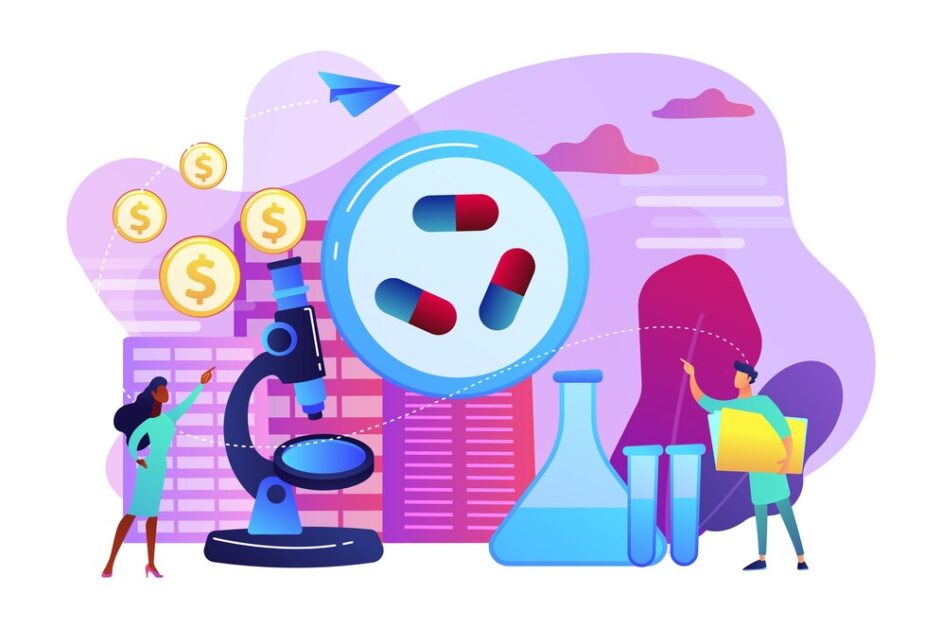17 December 2024
10 minutes read
MS in Biotechnology in the USA without GRE

Key Takeaways
- Many U.S. universities offer MS in Biotechnology programs without requiring the GRE.
- Graduates can pursue diverse careers in pharmaceuticals, healthcare, and research.
- Internships and research projects enhance practical experience and employability.
Biotechnology is an exciting and rapidly evolving field, consistently contributing to advancements in various sectors. From medical innovations to environmental solutions, biotechnology is at the heart of scientific progress.
Graduates can find opportunities in pharmaceutical companies, healthcare institutions, research laboratories, government agencies, and more.
For students considering a postgraduate degree in this dynamic field, the USA offers many options, some of which do not even require a GRE score. This guide aims to provide an in-depth understanding of pursuing an MS in Biotechnology in the USA without the GRE.
The Emergence of Biotechnology
History and Evolution of Biotechnology
Biotechnology, a fusion of biology and technology, has been around for thousands of years, dating back to the time when humans began farming and breeding animals.
However, modern biotechnology is relatively new, starting with the discovery of DNA in the mid-20th century.
The Modern Biotechnology Industry
Today, biotechnology has become a critical part of various industries, from healthcare and pharmaceuticals to agriculture, environmental sciences, and more.
It’s a sector characterized by continual growth and evolution, underpinned by scientific breakthroughs and technological advancements.
Understanding MS in Biotechnology
What is an MS in Biotechnology?
An MS in Biotechnology is a postgraduate degree designed to equip students with an understanding of the theoretical and practical aspects of biotechnology. This course focuses on topics like genetic engineering, molecular biology, bioinformatics, and more.
Biotechnology is the use of living systems and organisms to develop or make products…
– UNESCO
Potential Career Paths in Biotechnology
An MS in Biotechnology can lead to a variety of career paths. Graduates can work in research and development, quality control, regulatory affairs, clinical research, sales, and marketing, among others.
They can find opportunities in pharmaceutical companies, healthcare institutions, research laboratories, government agencies, and more.
Significance of GRE in Admissions
The Role of GRE
The Graduate Record Examination (GRE) is a standardized test often used by universities in their admissions process. It measures the student’s analytical writing, verbal reasoning, and quantitative reasoning skills.
Why Some Universities Don’t Require GRE
Interestingly, many universities in the USA have started to drop the GRE requirement from their admissions process.
These universities believe that the student’s academic performance, research experience, and passion, as reflected in their statement of purpose and letters of recommendation, are more important indicators of their potential success in the program.
Top Universities for MS in Biotechnology in the USA
Pursuing an MS in Biotechnology in the USA can open up opportunities, thanks to the country’s rich academic resources, high-quality education, and cutting-edge research opportunities.
Importantly, numerous universities in the country offer this program without the requirement of a GRE score. Let’s take a closer look at some of these institutions.
Each university has its unique strengths and offerings, so it’s important to research thoroughly to find the best fit for your academic and career goals.
Pursuing an MS in Biotechnology in the USA can open up opportunities, thanks to the country’s rich academic resources, high-quality education, and cutting-edge research opportunities.
Importantly, numerous universities in the country offer this program without the requirement of a GRE score. Let’s take a closer look at some of these institutions.
| Rank | University | Location | Program Details |
|---|---|---|---|
| 1 | Stanford University | Stanford, CA | Interdisciplinary MS in Biomedical Informatics. |
| 2 | MIT | Cambridge, MA | MS in Biological Engineering, biotech focus. |
| 3 | UCSF | San Francisco, CA | MS in Biomedical Imaging, advanced techniques. |
| 4 | University of Pennsylvania | Philadelphia, PA | Comprehensive MS in Biotechnology. |
| 5 | Johns Hopkins University | Baltimore, MD | MS in Biotechnology, coursework and research. |
| 6 | UCSD | San Diego, CA | MS in Biomedical Sciences, Biotech concentration. |
| 7 | Columbia University | New York, NY | Focused MS in Biotechnology, research-oriented. |
| 8 | Duke University | Durham, NC | MS in Biomedical Sciences, various tracks. |
| 9 | Univ. of Wisconsin-Madison | Madison, WI | Industry-relevant MS in Biotechnology. |
| 10 | Univ. of Michigan | Ann Arbor, MI | MS in Biotechnology, strong research focus. |
While these are some of the top universities offering an MS in Biotechnology without a GRE requirement, there are many others as well.
It’s essential to research each university thoroughly and understand its program structure, curriculum, and admission requirements, to make an informed choice.
Each university has its unique strengths and specialties, and finding the right fit for you will depend on your specific interests, career goals, and academic background.

Diving Deep into the MS Biotechnology Program Structure
Here is a table that lists some common courses that students can expect to take during an MS in Biotechnology program:
- Molecular Biology:
- Genetic Engineering:
- Techniques to manipulate genetic material.
- Includes gene cloning, PCR, and DNA sequencing.
- Bioinformatics:
- Application of computer science and statistics.
- Used to analyze complex biological data.
- Biostatistics:
- Utilization of statistical methods.
- Applied to analyze data from biological experiments.
- Ethics in Biotechnology:
- Examination of ethical issues in biotech research.
- Explores the moral implications of biotech applications.
- Biotech Enterprise:
- Overview of business aspects in biotechnology.
- Covers intellectual property, patents, financing, and more.
- Biomanufacturing:
- Study of industrial production of biotech products.
- Focuses on items like vaccines, antibodies, and proteins.
- Regulatory Affairs:
- Study of regulatory requirements for biotech products.
- Understanding approvals and compliance.
- Clinical Trials:
- Overview of testing new biotech products in humans.
- Covers the process of clinical trials.
- Biotech Marketing:
- Study of marketing and sales strategies.
- Tailored to the biotechnology industry.
This list is not exhaustive and may vary depending on the university and the specific program. Some programs may also offer courses on specific areas of biotechnology, such as stem cell research, gene therapy, or biodefense.
Course Curriculum
An MS in Biotechnology typically involves studying various topics, from molecular biology and genetic engineering to bioinformatics and biostatistics.
Students also learn about the ethical, legal, and social implications of biotechnology, preparing them to become responsible biotechnologists.
Internship and Research Opportunities
Here is a table that lists some universities in the USA that offer internship and research opportunities for MS in Biotechnology students:
- Northeastern University:
- Internships with industry partnerships.
- Research areas include biomanufacturing and drug discovery.
- Johns Hopkins University:
- Collaboration with School of Medicine.
- Research focuses on regenerative medicine and cancer biology.
- University of Pennsylvania:
- Strong partnerships with top biotech companies.
- Research expertise in gene therapy and immunotherapy.
- University of California, Berkeley:
- Access to UC Berkeley resources.
- Research emphasis on stem cells and synthetic biology.
- Northwestern University:
- Collaboration with medical systems.
- Research areas encompass cancer biology and drug delivery.
These are just a few examples, and many other universities in the USA offer similar opportunities. Students should research each university thoroughly to understand their specific internship and research offerings.
Internships and research opportunities provide students with hands-on experience, allowing them to apply what they’ve learned in real-world scenarios. These experiences can be invaluable for developing practical skills, building professional networks, and enhancing their resumes.
Many universities provide students with internship opportunities at biotech companies, research labs, and other relevant organizations.
These internships give students hands-on experience, helping them apply what they’ve learned in real-world scenarios.
Potential Career Outcomes
After graduation, students can pursue careers as biotechnology researchers, lab managers, biotech sales representatives, quality control analysts, and more. They might also consider further study in the form of a Ph.D. in Biotechnology or related fields.
Did You Know?
The biotechnology industry in the USA is a significant contributor to the economy, with the Bureau of Labor Statistics projecting a 7% growth in employment for biological technicians from 2018 to 2028, reflecting the industry’s dynamic nature and the demand for skilled professionals.
Eligibility Criteria for MS in Biotechnology in the USA
Academic Requirements
Requirement: Bachelor’s Degree
- A bachelor’s degree in a relevant field like biology, biochemistry, or chemistry.
- Should have a good GPA.
Requirement: Transcripts
- Official transcripts are needed from all attended universities.
Requirement: Letters of Recommendation
- Letters from professors and/or employers.
Requirement: Statement of Purpose
- A statement describing academic interests and career goals.
Language Proficiency Requirements
Requirement: English Proficiency Test
- International students need to prove English proficiency via TOEFL or IELTS.
- Waiver is possible if prior education was in English.
Other Requirements
Requirement: Work Experience
- Some universities may mandate work experience in biotechnology.
Requirement: GRE Scores
- GRE scores might be required by some universities, but many are eliminating this requirement.
Requirement: Interview
- Interviews could be part of the admissions process for some universities.
It’s essential to research each university thoroughly to understand its specific admission requirements and deadlines.
Additionally, international students should also consider visa requirements and financial aspects, such as tuition fees and living costs, before applying for an MS in Biotechnology program in the USA.
Language Proficiency Requirements
Most universities require international students to demonstrate English language proficiency. This is typically done through tests like the TOEFL or IELTS.
However, some universities may waive this requirement if the student’s previous education was conducted in English.
Personal Statement and Letters of Recommendation
Universities usually require a personal statement or a statement of purpose and letters of recommendation. These documents allow the admissions committee to understand the student’s academic interests, career goals, and suitability for the program.

Financial Aspects of Studying MS in Biotechnology in the USA
Tuition Fees and Living Costs
Studying in the USA can be expensive, with tuition fees varying from one university to another. In addition to tuition fees, students should also consider the cost of living, which includes accommodation, food, transportation, and other expenses.
Scholarship and Funding Opportunities
Fortunately, many universities offer scholarships and financial aid to international students. Additionally, there are also opportunities for part-time work and paid internships that can help students finance their education.
Why Pursue an MS in Biotechnology in the USA
- Quality of Education: US universities are renowned for high-quality education, expert faculty, and advanced research facilities.
- Research and Innovation Opportunities: The USA leads in biotechnological research and innovation, providing students with hands-on research chances and practical learning.
- Career Prospects and Salary Expectations: The USA’s biotech industry flourishes, offering skilled professionals abundant job opportunities and competitive salaries.
The best way to predict the future is to invent it.
– Alan Kay
Living and Studying in the USA as an International Student
As an international student, studying in the USA provides a chance to experience a new culture, meet people from around the world, and gain a globally recognized qualification. However, moving to a new country can also come with its challenges.
Before you arrive, you’ll need to secure a student visa. Once you’ve been accepted into a program, your university will provide you with the necessary documentation to apply for your visa.
Once you’re in the USA, you’ll need to find housing, either on-campus or off-campus. Many universities offer on-campus housing for international students, which can be a great way to meet people and get involved in campus life.
You’ll also need to plan your finances. Tuition fees for MS in Biotechnology programs can vary widely, so it’s essential to budget accordingly. In addition to tuition, you’ll also need to budget for living expenses like housing, food, and health insurance.
Studying in the USA is a significant investment, but the potential returns in terms of career opportunities and personal growth are immense. You’ll not only gain a high-quality education but also develop a global perspective and valuable life skills.
To ensure your time in the USA is a success, take advantage of the support services offered by your university. These might include academic advising, career services, and international student support services. These resources can provide invaluable guidance and make your transition to life in the USA easier.
Conclusion
Pursuing an MS in Biotechnology in the USA without a GRE is a viable and exciting option. With its world-class education system, advanced research opportunities, and promising career prospects, the USA is an excellent destination for aspiring biotechnologists.
Remember, a GRE score is just one of the many factors considered in the admissions process. It’s your passion, dedication, and commitment to your field that will ultimately determine your success.
So, don’t let the absence of a GRE score deter you from pursuing your dreams. Instead, use this opportunity to showcase your skills, abilities, and potential to make a meaningful contribution to the world of biotechnology.
Define industry excellence with Ambitio Pro as your partner. Our commitment to your growth is reflected in our tailored programs, expert-led training, and a community that inspires and challenges you to set new standards in your professional life.
FAQs
Can I pursue an MS in Biotechnology in the USA without a GRE?
Yes, numerous universities in the USA offer MS in Biotechnology programs without requiring a GRE score for admission.
What are some universities in the USA that offer MS in Biotechnology without GRE?
Some universities that offer MS in Biotechnology without GRE include Johns Hopkins University, Northeastern University, the University of Pennsylvania, the University of California, Berkeley, and Northwestern University.
What are the eligibility criteria for an MS in Biotechnology in the USA without a GRE?
Typically, you will need a bachelor’s degree in a related field, proof of English language proficiency, and letters of recommendation. Some universities may also require a Statement of Purpose.
What career opportunities are available after completing an MS in Biotechnology in the USA?
Career opportunities in the biotechnology field are vast and include roles like Research Scientist/Associate, Biotechnology Engineer, Quality Control Analyst, Clinical Research Coordinator, and Bioinformatics Specialist.
What is the duration of the MS in Biotechnology program in the USA?
Generally, an MS in Biotechnology program in the USA takes two years to complete.
Do I need a background in science to pursue an MS in Biotechnology in the USA?
Yes, typically, universities require that you have a bachelor’s degree in a related field such as Biology, Chemistry, Biochemistry, or Bioengineering.
What is the average salary for a biotechnology professional in the USA?
While salaries can vary widely based on the specific role, location, and level of experience, the average salary for biotechnology professionals in the USA is quite competitive. As per the U.S. Bureau of Labor Statistics, biochemists and biophysicists, for example, earned a median annual wage of $94,270 in May 2020.
What kind of visa do I need to study in the USA as an international student?
As an international student, you will typically need an F-1 visa to study in the USA. Once you’re accepted into a program, your university will provide you with the necessary documentation to apply for your visa.
Can I work while studying in the USA as an international student?
Yes, international students on an F-1 visa are typically allowed to work on-campus for up to 20 hours per week during the academic year and full-time during vacations. Off-campus employment opportunities are limited and require approval from the U.S. Citizenship and Immigration Services (USCIS).
Do universities in the USA offer scholarships for international students?
Yes, many universities in the USA offer scholarships for international students. However, the availability and criteria can vary by institution. It’s recommended to check the university’s official website or contact the admissions office for accurate information.
Is there an opportunity for industrial exposure or internships during the MS in Biotechnology program in the USA?
Yes, many programs offer internships or co-op experiences, which can provide students with practical industry experience.
What are some areas of specialization within the MS in Biotechnology program?
Some universities offer specializations or tracks in specific areas of biotechnology like Pharmaceutical Biotechnology, Agricultural Biotechnology, or Medical Biotechnology.
Can I stay in the USA after completing my MS in Biotechnology?
Yes, upon completion of your degree, you can apply for Optional Practical Training (OPT) that allows you to work in your field of study for up to 12 months. If you have a degree in a STEM field, which includes Biotechnology, you may be eligible to extend your OPT for an additional 24 months.
What is the application process for an MS in Biotechnology in the USA without GRE?
The application process can vary by university but generally includes submitting an application form, proof of English language proficiency, transcripts, letters of recommendation, and a Statement of Purpose. Some universities may also require a resume or CV. The application process can vary by university but generally includes submitting an application form, proof of English language proficiency, transcripts, letters of recommendation, and a Statement of Purpose. Some universities may also require a resume or CV.
Can I pursue a Ph.D. after completing an MS in Biotechnology in the USA?
Yes, after completing an MS in Biotechnology, you can choose to pursue a Ph.D. if you are interested in research or a career in academia.

You can study at top universities worldwide!
Get expert tips and tricks to get into top universities with a free expert session.
Book Your Free 30-Minute Session Now! Book a call now




























